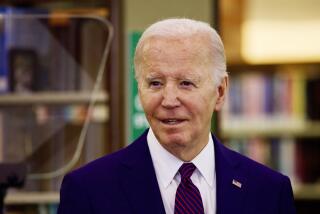Column: Bowing to anti-abortion lobby, Trump terminates crucial UCSF research contract
Bowing to pressure from the anti-abortion lobby, the Trump administration said Wednesday that it will end a contract with the University of California that used human fetal tissue to research treatments for infectious diseases such as HIV and the Zika virus.
The research, performed at the division of experimental medicine at UC San Francisco, received more than $2 million in funding from the National Institutes of Health last year. In December, however, the Department of Health and Human Services placed the contract on a series of 90-day extensions pending a review of all research involving “human fetal tissue from elective abortions.”
Health and Human Services said that the current extension expired Wednesday and “there will be no further extensions.”
For purely symbolic reasons, this is halting research that might actually save babies and children.
— R. Alta Charo, bioethicist
UCSF Chancellor Sam Hawgood issued a blistering statement calling the HHS action “politically motivated, shortsighted and not based on sound science.” The action, Hawgood said, ends a 30-year partnership between UCSF and the NIH using scientific models “that could be developed only through the use of fetal tissue to find a cure for HIV.”
He said UCSF had “exercised appropriate oversight and complied with all state and federal laws, and added, “The efforts by the administration to impede this work will undermine scientific discovery and the ability to find effective treatments” not only for HIV, but for Alzheimer’s, spinal cord injury and eye disease.
The decision drew fire from other medical experts who pointed out that fetal tissue research has been part of the battle against infectious disease for decades.
“Fetal tissue research has led to major scientific advances, including the virtual elimination of polio, measles and rubella in the U.S.,” said a statement from the Guttmacher Institute, which supports research into sexual and reproductive health.
“Fetal tissue research is also used in the development of vaccines against Ebola and HIV, the study of human development, and efforts to treat and cure conditions that affect millions of people across the United States,” the institute said. “Despite the President’s pledge to ‘end the HIV epidemic,’ today’s announcement poses a direct threat to crucial research to find treatments for HIV and other health threats.”
The research turned into a cause celebre last year for the religious right wing, which asserts that it prompts women to undergo abortions in order to fill “a demand for human body parts that must be taken from babies who are aborted.”
Experts say this is a fantasy. “There’s no evidence that the opportunity to donate tissue from fetal remains has ever led anyone to choose to have an abortion she might not otherwise have chosen,” says R. Alta Charo, a bioethicist at the University of Wisconsin. “In no way does it affect the number of abortions. In no way does it affect the number of fetuses that die.”
The research, however, aims to find treatments for conditions that disproportionately affect younger patients. “So for purely symbolic reasons, this is halting research that might actually save babies and children,” Charo told me.
The announcement reflects a pattern in the Trump administration of allowing ideological considerations to outweigh scientific judgment. “In reproductive health, climate change, the effect of pollution, we’re seeing a defiance of scientific fact when it comes to setting policy,” Charo says.
The fetal tissues are used to “humanize” lab mice by replicating human-like immune systems. Researchers say there are no suitable alternatives to the research method, and the government hasn’t identified any. HHS in its announcement Wednesday said it has allocated $20 million “to develop, demonstrate, and validate experimental models that do not rely on human fetal tissue from elective abortions.”
Health and Human Services tied its decision directly to White House policy. “Promoting the dignity of human life from conception to natural death is one of the very top priorities of President Trump’s administration,” its announcement said. The decision encompasses a discontinuance of research conducted internally at the National Institutes of Healthusing fetal tissue from elective abortions. Current grants to outside scientists will be allowed to run out to the end of their approval period.
Renewals and new research grants to outside scientists using the method will be subjected to review by a new ethics advisory board that will recommend “whether, in light of the ethical considerations, NIH should fund the research project,” Health and Human Services said.
That’s merely a device for blocking the research, Charo says. “We have had experience with this kind of thing before,” she says. During the Reagan and George H.W. Bush administrations, embryo research was to be reviewed by an ethics board, “but President Reagan and President Bush never put anyone on the board. So scientifically valuable experiments were left to sit for 12 years” until the requirement was lifted by President Clinton.
“This kind of review board can sound like action, but can be used for governmental inaction that prevents this research from going forward,” Charo says.
Keep up to date with Michael Hiltzik. Follow @hiltzikm on Twitter, see his Facebook page, or email michael.hiltzik@latimes.com.
Return to Michael Hiltzik’s blog.







